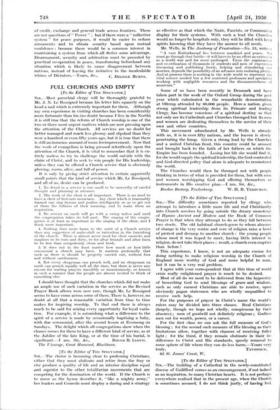FULL CHURCHES AND EMPTY [To the Editor of THE SPECTATOR.]
Sin,—Most parochial clergy will be thoroughly grateful to Mr. J. N. Le Rossignol because his letter hits squarely on the head a nail which is extremely important for them. Although my own experience in visiting churches has been considerably more fortunate than his (no doubt because I live in the North) it is still true that the reform of Church worship is one of the two or three most urgent matters which are now pressing upon the attention of the Church. All services are no doubt far better managed and mach less gloomy and slipshod than they were a hundred or even fifty years ago, but it is true that there is still an immense amount of room for improvement. Now that the work of evangelism is being pressed relentlessly upon the attention of the Church, it is vital to remember that it is en- tirely useless to try to challenge the world outside with the claim of Christ, and to seek to win people for His leadership,.
unless they can be offered a Church service that is obviously glowing, warm, alive, and full of power.
It is only by giving strict attention to certain apparently small points that the kind of service which Mr. Le Rossignol, and all of us, desire can be produced.
1. No detail in a service is too small to be unworthy of careful thought and planning in advance.
2. The work of the choir is all important-. There is no need to have a choir of first-rate musicians. Any choir which is reasonably trained can sing hymns and psalms intelligently so as to get out of them the fullness of their meaning, and to make them an inspiration.
3. No service on earth will go with a swing unless and until the congregation takes its full part. The singing of the congre- gation is at least as important as the singing of the choir, and I think more important.
4. Nothing does more harm to the spirit of a Church service than any suggestion of make-shift or tatterdom in the furnishing of the church. There is almost never need for choir cassocks and surplices to be torn and dirty, or for altar frontals and altar linen to be less than scrupulously clean and fresh.
5. It does not in the least matter how much or how little ceremonial a church may have. It matters profoundly that such as there is should be properly carried out, without fuss and without carelessness. • 6. Not every clergyman can preach well, and no clergyman on earth can preach equally well all the time, but there is never any excuse for reading prayers inaudibly or monotonously, or lessons in such a manner that the people are almost invited to think of something else.
I should have thought that the churches which did not make
an ample use of such variation in the service as the Revised Prayer Book allows were now rare, though Mr. Le Rossignol seems to have come across some of them. There is, however, no
doubt at all that a reasonable variation from time to time makes for inspiring worship. To that end there is always much to be said for seizing every opportunity for loyal varia- tion. For example, it is astonishing what a difference to the spirit of a service is made by occasionally baptising a baby, with due ceremonial, after the second lesson at Evensong on Sundays. The delight which all congregations show when the chance comes for them to have a different kind of service, as at the Jubilee of the late King, or at the time of his burial, is


















































 Previous page
Previous page